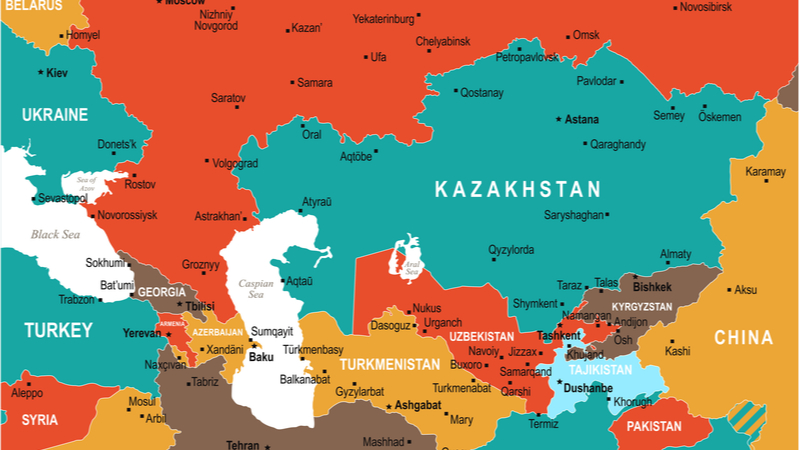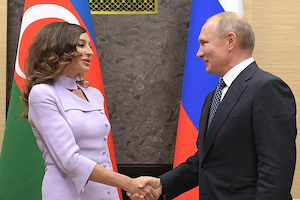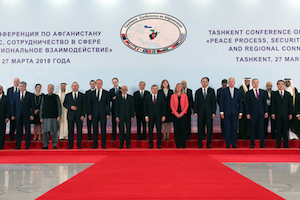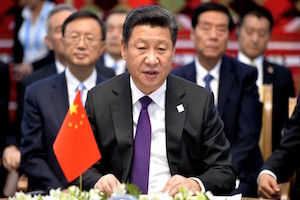China's Debt-Trap Diplomacy in Central Asia
By Vali Kaleji
Over the past decade, “Debt-trap Diplomacy” has emerged as a significant instrument for China to advance its Belt and Road Initiative (BRI). The inability of certain nations, such as Sri Lanka and various African countries, to repay their loans has resulted in China acquiring ownership of key infrastructure, including ports and mines. However, the repercussions of China’s debt-trap diplomacy vary across Central Asian countries. Kazakhstan’s debt to China is considered the most manageable within the region. Uzbekistan, benefiting from economic growth, and Turkmenistan, leveraging gas exports to China, do not encounter substantial difficulties. Conversely, Kyrgyzstan and Tajikistan are the most susceptible Central Asian nations to China’s “Debt-trap Diplomacy.”
BACKGROUND: The concept of “Debt-trap Diplomacy” was first introduced by Indian academic Brahma Chellaney in 2017. This term describes a relatively new policy tool employed by China in connection with its Belt and Road Initiative (BRI). The strategy involves China extending excessive loans to low-income, heavily indebted countries that are unable to repay them. Consequently, these borrowing nations are compelled to cede strategic assets to China in a debt-for-equity swap to alleviate their debt burden. Recent studies indicate that Beijing has also become a significant emergency rescue lender to these same countries, many of which are struggling to manage their debts. Between 2008 and 2021, China allocated US$ 240 billion to bail out 22 countries, predominantly those involved in Xi Jinping’s BRI. Countries such as Sri Lanka, Pakistan, Mongolia, Zambia, Congo, Djibouti, Kenya, and Ethiopia have been notably impacted by China’s debt-trap policy in recent years. A prominent example of this policy is the Hambantota port in Sri Lanka. The Chinese government provided a loan for the port’s development, which was carried out by Chinese contractors. When Sri Lanka failed to meet its loan repayments, China leased the port for 99 years as a form of debt repayment. This 99-year lease is strategically significant for Beijing, particularly in the context of its competition with India in the Indian Ocean. In Central Asia, statistical data indicate that with the expansion of China’s economic and commercial influence, the debt owed by countries in this region to Beijing has increased significantly. By the first half of 2023, Central Asia’s collective debt to China had reached US$ 15.7 billion, representing 7.6 percent of the region’s external debt. Kazakhstan, in particular, has accumulated a substantial amount of hidden debt. According to central bank data, as of January 1, 2024, Astana owed US$ 9.2 billion, primarily to the China Export-Import Bank (Exim Bank). However, this debt constitutes only about 3.5 percent of Kazakhstan’s gross domestic product (GDP), a figure that has remained relatively stable over the past three years. Tajikistan, on the other hand, owes an estimated US$ 3.3 billion to foreign investors, with half of this amount owed to China, equating 27 percent of its total GDP. Consequently, China is Tajikistan’s primary creditor. According to the Ministry of Finance of Tajikistan, as of early 2024, the country’s debt to China stood at US$ 900 million, which accounts for 27.8 percent of its total external debt. By the end of 2023, Uzbekistan’s debt to China amounted to US$ 3.775 billion, representing just under 13 percent of its total external debt. Notably, by 2022, the China Development Bank (CDB) held US$ 2.2 billion of this debt, making it Uzbekistan’s third-largest creditor. Kyrgyzstan, meanwhile, has approximately US$ 4 billion in outstanding loans to China, which constitutes around 40 percent of its total GDP. This equates to roughly US$ 700 owed to China per Kyrgyz citizen. The country’s bilateral concessional loans exceed US$ 2 billion, or 44 percent of its total debt. Of this, 36.7 percent of Kyrgyzstan’s foreign debt is owed to the Export-Import Bank of China, amounting to US$ 1.7 billion in 2023. Akylbek Japarov, the chairman of the Kyrgyz Cabinet of Ministers, has stated that the country has reached the peak of its external debt payments. Kyrgyz President Sadyr Japarov has expressed optimism that, if the current situation remains stable, the country’s foreign debt could be paid off by 2035. Regarding Turkmenistan, the information available is limited and unclear. The only notable instance is a statement by then-President Gurbanguly Berdymukhamedov on June 12, 2021, asserting that Turkmenistan had fully repaid loans provided by China for the pipeline and the first stage of the Galkynysh gas field development on time and in full.
IMPLICATIONS: Over the past two decades, China has supplanted Russia as the primary economic and trading partner of Central Asian countries. Debt-trap diplomacy plays a crucial role in solidifying this shift. The inability of Central Asian nations, particularly those with weaker economies like Kyrgyzstan and Tajikistan, to repay their loans could result in China acquiring ownership of key infrastructure within these countries. For instance, China might gain control over the Kyrgyz thermal power plant in Bishkek, the Datka-Kemin power transmission line, and the road connecting the northern and southern regions of Kyrgyzstan. Similarly, China could potentially own and manage Tajikistan’s gold and silver mines. Consequently, the capacity of Central Asian countries, especially Kyrgyzstan and Tajikistan, to repay their debts to China holds significant and long-term strategic implications. Debt repayment can sustain China as a crucial economic and trade partner for Central Asian countries, which is vital for maintaining a balance against Russia. However, the inability to repay these loans will lead to a strong dependence on China, creating conditions similar to Russia’s relationships with Belarus and Armenia. In 2002, under the “Property for Debt” agreement between then-President of Armenia Robert Kocharian and the Russian Federation, Armenia’s inability to repay its loans resulted in the Russian government taking ownership of significant economic infrastructure, including electricity, gas, telecommunications, and railways. This process has significantly contributed to Armenia’s strong dependence on Russia. Even after two decades, despite considerable dissatisfaction with Russia, Nikol Pashinyan’s government has struggled to establish a more independent and diverse foreign policy. Similarly, debt-trap diplomacy and China’s potential ownership of infrastructure could lead to comparable outcomes for Kyrgyzstan and Tajikistan, akin to the situation in Armenia or the Hambantota port in Sri Lanka. This scenario poses a serious challenge for these small Central Asian countries in terms of “diversifying” and “balancing” their foreign policies. This challenging process has led to a rise in anti-Chinese sentiments and Sinophobia in Kyrgyzstan and Tajikistan in recent years. Notably, in 2011, Tajikistan resolved a border dispute by ceding land, a move believed to be part of a debt relief agreement with China. Furthermore, in 2018, over 30,000 Chinese migrants, many of whom were construction workers on BRI-funded projects, arrived in Kyrgyzstan. Given this context, there are serious concerns about the negative and potentially dangerous consequences of China’s debt-trap diplomacy in Kyrgyzstan and Tajikistan. Tajik political scientist Parviz Mullojanov has warned that accumulating Chinese debt is “playing with fire,” as it could serve as a pretext for political and geopolitical expansion at any moment. However, leaders and experts close to Central Asian governments dismiss these concerns as Western propaganda against China. They argue that borrowing and repayment are part of economic interdependence in today’s world, which can foster economic growth. This perspective is reflected in signs around Tajikistan’s capital that read: “Assistance from China for a common future.” On the other hand, the lack of transparency in Chinese loan agreements, coupled with infrastructure investments, has exacerbated issues of corruption and oligarchy. Kazakhstan and Uzbekistan appear to face fewer challenges and threats from China’s debt-trap diplomacy, largely due to their stable and growing economies. Additionally, Turkmenistan stands out as the only Central Asian country with a positive trade balance with China, primarily due to its gas exports. Consequently, the loans and debt to China, whose full extent remains unclear, do not pose a significant threat to Turkmenistan’s economy.
CONCLUSIONS: Over the past 22 years, China has invested US$ 105 billion in Central Asia through development finance, with the China Development Bank (CDB) playing a pivotal role in this process. “Debt-trap Diplomacy” has become a crucial tool for advancing China’s Belt and Road Initiative (BRI) as it enters its second decade. During a virtual summit in January 2022, marking 30 years of diplomatic ties with Central Asian countries, Chinese President Xi Jinping announced that China would provide US$ 500 million in aid to Central Asia over the next three years to support socially significant projects. Furthermore, in October 2023, at the Third Belt and Road Forum for International Cooperation, China and Central Asian states adopted a joint action plan for developing green technology in the region. Given these developments, it is expected that China’s loan policies and debt-trap diplomacy will continue in Central Asia. The ongoing conflict in Ukraine presents an opportunity for China to further expand its economic and financial influence in the region, similar to the Ruble Crisis of 1998. However, the impact of China’s debt-trap diplomacy varies across Central Asian countries. Kazakhstan’s debt to China is considered the most manageable by regional standards. Uzbekistan, benefiting from economic growth, and Turkmenistan, with its positive trade balance due to gas exports to China, do not face significant challenges. In contrast, Kyrgyzstan and Tajikistan are the most vulnerable to China’s debt-trap diplomacy. If these countries are unable to repay their substantial debts to China, which constitute a significant portion of their GDP, they may face situations similar to those experienced by Sri Lanka and Armenia. This could pose serious challenges to their efforts to diversify and balance their foreign policies.
AUTHOR'S BIO: Vali Kaleji, based in Tehran, Iran, holds a Ph.D. in Regional Studies, Central Asian and Caucasian Studies. He has published numerous analytical articles on Eurasian issues for the Eurasia Daily Monitor, the Central Asia-Caucasus Analyst, The Middle East Institute and the Valdai Club. He can be reached at This email address is being protected from spambots. You need JavaScript enabled to view it. .
Tilting at windmills: Washington's quest for bases in Central Asia
By Stephen Blank
November 24, 2021, the CACI Analyst
As part of the continuing story of the U.S. involvement in Afghanistan Washington is evidently still negotiating for bases in Central Asia. The idea here is to be able to carry out “over the Horizon” (OTH) operations in Afghanistan for counter-terrorist purposes. It also turns out that Washington and Moscow were discussing this issue in the talks between Chief of the General Staff, General Valery Gerasimov and General Mark Milley, Chairman of the Joint Chiefs of Staff. Those discussions apparently derived from remarks made by President Putin in his earlier summit with President Biden in Geneva offering the U.S. the opportunity to base evacuation flights in Russian bases in Central Asia.

Azerbaijan-Russia Relations Warm Up
By Natalia Konarzewska
February 3, 2020, the CACI Analyst
The end of 2019 saw increasing diplomatic activity between Azerbaijan and Russia, at a time when Russia wants to strengthen its profile in Azerbaijan and bring the country closer to Moscow-promoted multilateral initiatives. This is partly due to Azerbaijan’s increasing geopolitical importance to the West and China, being a key participant in the Southern Gas Corridor and a prospectively important one in the Belt and Road initiative (BRI). Russia also wants Azerbaijan to counterbalance its traditional South Caucasus ally Armenia, whereas Azerbaijan expects Russia’s assistance in resolving the Nagorno-Karabakh conflict, which is nevertheless unlikely to materialize.

The Tashkent Conference on Afghanistan: Too Much Diplomacy, Too Little Solution
By Farkhod Tolipov
May 29, 2018, the CACI Analyst
On March 26-27, 2018, the unprecedented international conference on Afghanistan, “Peace process, security cooperation and regional interactions,” took place in Uzbekistan’s capital Tashkent. Diplomatic representatives of 21 states, the UN and the EU participated in the conference and signed its final Tashkent Declaration. The event signaled a transformation of Tashkent’s previous positions on Afghanistan, from past initiatives in the form of narrow formula-like approaches to a system-oriented strategy. However, the Tashkent Declaration and speeches given at the conference reveal that the approach contains too much diplomacy and too little solution, especially given the growing terrorism threat in the country.

China's Peacemaking Between Pakistan and Afghanistan
By Sudha Ramachandran
September 7, 2017, the CACI Analyst
With its shuttle diplomacy between Pakistan and Afghanistan to ease tensions between the two neighbors, China has expanded its peacemaking role in the Afghan conflict. Successful peacemaking is vital for ensuring stability in the region, which in turn is needed to secure the future of China’s Belt and Road Initiative. It will require Beijing to move beyond offering Kabul and Islamabad economic incentives to address the core issue underlying Afghanistan-Pakistan estrangement: alleged support to acts of terror directed against each other. Given its own strong interests in undertaking peacemaking, can China be an honest broker?




